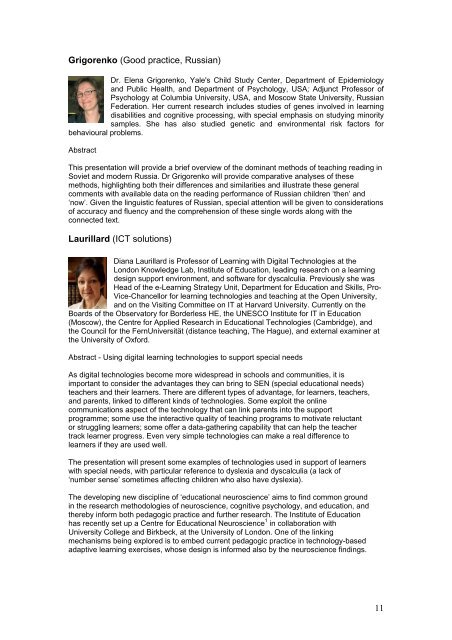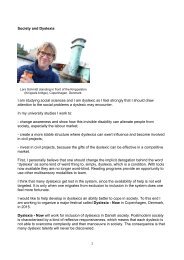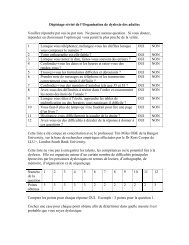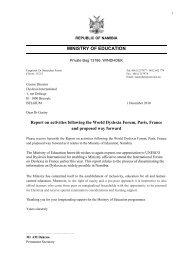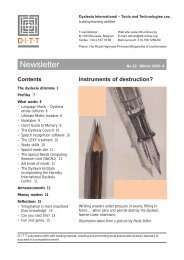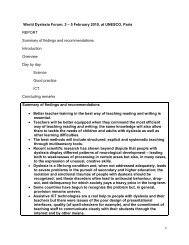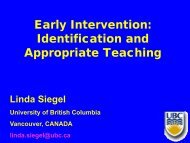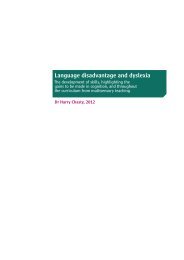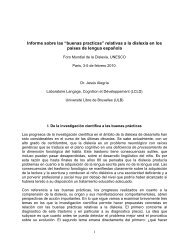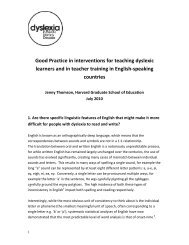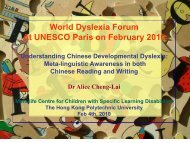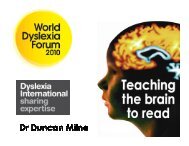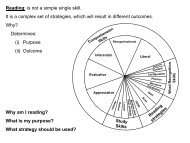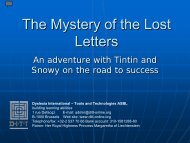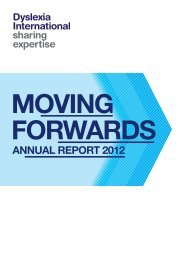Best practice in the teaching of reading and writing - Dyslexia ...
Best practice in the teaching of reading and writing - Dyslexia ...
Best practice in the teaching of reading and writing - Dyslexia ...
Create successful ePaper yourself
Turn your PDF publications into a flip-book with our unique Google optimized e-Paper software.
Grigorenko (Good <strong>practice</strong>, Russian)<br />
Dr. Elena Grigorenko, Yale's Child Study Center, Department <strong>of</strong> Epidemiology<br />
<strong>and</strong> Public Health, <strong>and</strong> Department <strong>of</strong> Psychology, USA; Adjunct Pr<strong>of</strong>essor <strong>of</strong><br />
Psychology at Columbia University, USA, <strong>and</strong> Moscow State University, Russian<br />
Federation. Her current research <strong>in</strong>cludes studies <strong>of</strong> genes <strong>in</strong>volved <strong>in</strong> learn<strong>in</strong>g<br />
disabilities <strong>and</strong> cognitive process<strong>in</strong>g, with special emphasis on study<strong>in</strong>g m<strong>in</strong>ority<br />
samples. She has also studied genetic <strong>and</strong> environmental risk factors for<br />
behavioural problems.<br />
Abstract<br />
This presentation will provide a brief overview <strong>of</strong> <strong>the</strong> dom<strong>in</strong>ant methods <strong>of</strong> teach<strong>in</strong>g read<strong>in</strong>g <strong>in</strong><br />
Soviet <strong>and</strong> modern Russia. Dr Grigorenko will provide comparative analyses <strong>of</strong> <strong>the</strong>se<br />
methods, highlight<strong>in</strong>g both <strong>the</strong>ir differences <strong>and</strong> similarities <strong>and</strong> illustrate <strong>the</strong>se general<br />
comments with available data on <strong>the</strong> read<strong>in</strong>g performance <strong>of</strong> Russian children ‘<strong>the</strong>n’ <strong>and</strong><br />
‘now’. Given <strong>the</strong> l<strong>in</strong>guistic features <strong>of</strong> Russian, special attention will be given to considerations<br />
<strong>of</strong> accuracy <strong>and</strong> fluency <strong>and</strong> <strong>the</strong> comprehension <strong>of</strong> <strong>the</strong>se s<strong>in</strong>gle words along with <strong>the</strong><br />
connected text.<br />
Laurillard (ICT solutions)<br />
Diana Laurillard is Pr<strong>of</strong>essor <strong>of</strong> Learn<strong>in</strong>g with Digital Technologies at <strong>the</strong><br />
London Knowledge Lab, Institute <strong>of</strong> Education, lead<strong>in</strong>g research on a learn<strong>in</strong>g<br />
design support environment, <strong>and</strong> s<strong>of</strong>tware for dyscalculia. Previously she was<br />
Head <strong>of</strong> <strong>the</strong> e-Learn<strong>in</strong>g Strategy Unit, Department for Education <strong>and</strong> Skills, Pro-<br />
Vice-Chancellor for learn<strong>in</strong>g technologies <strong>and</strong> teach<strong>in</strong>g at <strong>the</strong> Open University,<br />
<strong>and</strong> on <strong>the</strong> Visit<strong>in</strong>g Committee on IT at Harvard University. Currently on <strong>the</strong><br />
Boards <strong>of</strong> <strong>the</strong> Observatory for Borderless HE, <strong>the</strong> UNESCO Institute for IT <strong>in</strong> Education<br />
(Moscow), <strong>the</strong> Centre for Applied Research <strong>in</strong> Educational Technologies (Cambridge), <strong>and</strong><br />
<strong>the</strong> Council for <strong>the</strong> FernUniversität (distance teach<strong>in</strong>g, The Hague), <strong>and</strong> external exam<strong>in</strong>er at<br />
<strong>the</strong> University <strong>of</strong> Oxford.<br />
Abstract - Us<strong>in</strong>g digital learn<strong>in</strong>g technologies to support special needs<br />
As digital technologies become more widespread <strong>in</strong> schools <strong>and</strong> communities, it is<br />
important to consider <strong>the</strong> advantages <strong>the</strong>y can br<strong>in</strong>g to SEN (special educational needs)<br />
teachers <strong>and</strong> <strong>the</strong>ir learners. There are different types <strong>of</strong> advantage, for learners, teachers,<br />
<strong>and</strong> parents, l<strong>in</strong>ked to different k<strong>in</strong>ds <strong>of</strong> technologies. Some exploit <strong>the</strong> onl<strong>in</strong>e<br />
communications aspect <strong>of</strong> <strong>the</strong> technology that can l<strong>in</strong>k parents <strong>in</strong>to <strong>the</strong> support<br />
programme; some use <strong>the</strong> <strong>in</strong>teractive quality <strong>of</strong> teach<strong>in</strong>g programs to motivate reluctant<br />
or struggl<strong>in</strong>g learners; some <strong>of</strong>fer a data-ga<strong>the</strong>r<strong>in</strong>g capability that can help <strong>the</strong> teacher<br />
track learner progress. Even very simple technologies can make a real difference to<br />
learners if <strong>the</strong>y are used well.<br />
The presentation will present some examples <strong>of</strong> technologies used <strong>in</strong> support <strong>of</strong> learners<br />
with special needs, with particular reference to dyslexia <strong>and</strong> dyscalculia (a lack <strong>of</strong><br />
‘number sense’ sometimes affect<strong>in</strong>g children who also have dyslexia).<br />
The develop<strong>in</strong>g new discipl<strong>in</strong>e <strong>of</strong> ‘educational neuroscience’ aims to f<strong>in</strong>d common ground<br />
<strong>in</strong> <strong>the</strong> research methodologies <strong>of</strong> neuroscience, cognitive psychology, <strong>and</strong> education, <strong>and</strong><br />
<strong>the</strong>reby <strong>in</strong>form both pedagogic <strong>practice</strong> <strong>and</strong> fur<strong>the</strong>r research. The Institute <strong>of</strong> Education<br />
has recently set up a Centre for Educational Neuroscience 1 <strong>in</strong> collaboration with<br />
University College <strong>and</strong> Birkbeck, at <strong>the</strong> University <strong>of</strong> London. One <strong>of</strong> <strong>the</strong> l<strong>in</strong>k<strong>in</strong>g<br />
mechanisms be<strong>in</strong>g explored is to embed current pedagogic <strong>practice</strong> <strong>in</strong> technology-based<br />
adaptive learn<strong>in</strong>g exercises, whose design is <strong>in</strong>formed also by <strong>the</strong> neuroscience f<strong>in</strong>d<strong>in</strong>gs.<br />
11


